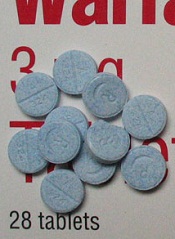
Results of the PADIS-PE trial suggest that patients with a first episode of pulmonary embolism (PE) benefit from extended anticoagulation therapy, but that benefit is lost after the treatment is stopped.
When patients received warfarin for 18 months after an initial 6 months of anticoagulation therapy, they had a lower risk of venous thromboembolism (VTE)
recurrence than patients who did not receive additional anticoagulation.
However, this benefit was lost once the patients stopped taking warfarin.
Francis Couturaud, MD, PhD, of the Universite de Bretagne Occidentale in Brest, France, and his colleagues reported these findings in JAMA.
The researchers analyzed 371 adult patients who had experienced a first episode of symptomatic, unprovoked PE and were initially treated for 6 months with a vitamin K antagonist.
The patients were then randomized to warfarin or placebo for 18 months. After randomization, 4 patients were lost to follow-up, all after month 18, and 1 withdrew due to an adverse event.
The median follow-up was 24 months. The primary outcome was a composite of recurrent VTE and major bleeding at 18 months after randomization.
During the 18-month treatment period, the primary outcome occurred in 3% (6/184) of patients in the warfarin arm and 13.5% (25/187) in the placebo arm (hazard ratio [HR]=0.22, P=0.001).
This was driven by a reduction in the risk of recurrent VTE, as the risk of major bleeding was higher in the warfarin arm. Recurrent VTE occurred in 3 patients in the warfarin arm and 25 in the placebo arm (HR=0.15, P<0.001). And major bleeding occurred in 4 patients in the warfarin arm and 1 in the placebo arm (HR=3.96, P=0.22).
Once patients stopped receiving warfarin, the reduction in risk of VTE recurrence was lost. During the entire study period (a median of 41 months), the primary outcome occurred in 21% (n=33) of patients in the warfarin arm and 24% (n=42) in the placebo arm (HR=0.75, P=0.22).
There was no significant difference between the treatment arms with regard to recurrent VTE (HR=0.69, P=0.14) or major bleeding (HR=1.12, P=0.85).
The researchers said these results suggest patients with an unprovoked PE require long-term VTE prevention measures. But further investigation is needed to determine whether these should include systematic treatment with vitamin K antagonists, new anticoagulants, or aspirin, or whether the measures should be tailored according to patient risk factors.


